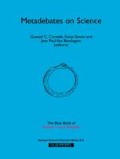Abstract
Whether the physical world is composed of indivisible atoms, or alternatively is an infinitely divisible continuum, is a long standing question in natural philosophy. The proposition that the world is composed of atoms (the smallest particles) is a natural extension of the physics of macroscopic solid bodies to a microscopic domain. Solid bodies are the tangible constituents of the macroscopic world, whereas commonly observed waves (e.g., in water) occur as the concerted, oscillational motion within a physical medium apparently consisting of material particles in the liquid or gaseous state rather than as a solid. Thus waves have been regarded as a phenomenon in physical systems rather than the fundamental basis of the physical world. Specifically Newton postulated that light is composed of a stream of particles, and after the discovery of the wave properties of light (diffraction and interference) it was thought to be a wave motion within some underlying medium (the “ether”).
Access this chapter
Tax calculation will be finalised at checkout
Purchases are for personal use only
Preview
Unable to display preview. Download preview PDF.
References
Lucas, J.R., and Hodgson, P.E., Spacetime and Electromagnetism, Clarendon Press, Oxford, 1990.
Prosser, R.D., “The Interpretation of Diffraction and Interference in terms of Energy Flow”, International Journal of Theoretical Physics, Vol. 15, 1976, pp. 169–180.
Thèses presentées par Louis de Broglie, premier thèse “Recherches sur La Theorie des Quanta”, Masson et Companie, Editeurs, Libraires de l’Académie de Médecine, Paris, 1924.
A reconsideration and extension (in English) has been given by Mioara Mugur-Schachter (“Quantum Mechanics and Relativity: Attempt as a New Start”, Found. of Physics Letters, Vol. 2, 3, 1989, pp. 261–286.
A translation of Chapter 1 of de Broglie’s thesis entitled The Relationship Between the Quantum and Relativity was published (American Journal of Physics, Vol. 40 Sept. 1972, pp. 1315–1319).
Hunter, G., and Robert L.P., “Wadlinger Photons and Neutrinos as Electromagnetic Solitons”, Physics Essays, Vol. 2, 1989, pp. 158–172.
Diner, S., Fargue, D., Lochak, G., and Selleri, F. (eds.), The Wave-Particle Dualism, D. Reidel, Dordrecht, 1984.
Author information
Authors and Affiliations
Editor information
Editors and Affiliations
Rights and permissions
Copyright information
© 1999 Springer Science+Business Media Dordrecht
About this chapter
Cite this chapter
Hunter, G. (1999). Soliton Waves VS. The Particle Paradigm: The Elementary Nature of the Physical World. In: Cornelis, G.C., Smets, S., Van Bendegem, J.P. (eds) Metadebates on Science. EINSTEIN MEETS MAGRITTE: An Interdisciplinary Reflection on Science, Nature, Art, Human Action and Society, vol 6. Springer, Dordrecht. https://doi.org/10.1007/978-94-017-2245-2_16
Download citation
DOI: https://doi.org/10.1007/978-94-017-2245-2_16
Publisher Name: Springer, Dordrecht
Print ISBN: 978-90-481-5242-1
Online ISBN: 978-94-017-2245-2
eBook Packages: Springer Book Archive

